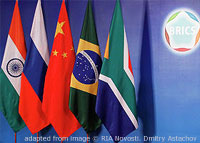Four BRICS Deals Expected When Putin Visits Africa

(Moscow Times – themoscowtimes.com – Rajeev Sharma – March 20, 2013)
NEW DELHI At least four deals will be reached at a BRICS summit that President Vladimir Putin will attend in South Africa next week, including the establishment of a business council and a consortium of think tanks from BRICS countries, a senior Indian official said.
Also high on the agenda will be plans to create a BRICS development bank and a BRICS education rating agency, but no breakthroughs are expected on those issues at the Durban summit on March 26 and 27, said the official, who had attended a just-finished three-day planning meeting of BRICS officials in South Africa.
“The BRICS bank issue requires some more discussions. This will be taken up at a BRICS finance ministers meeting just before the summit,” the official said, speaking on condition of anonymity because he was not authorized to talk to the media.
“As for the BRICS rating agency, it is a work in progress and I cannot say anything beyond that,” he said.
But the official said there would be at least four concrete deliverables during the fifth BRICS summit, including two that specifically apply to Russia: The BRICS business council, which will promote trade between BRICS countries, and the consortium of think tanks, which will draft strategy. The other two summit deliverables are Africa-specific programs: co-financing agreements for infrastructure and sustainable development.
The big-ticket projects of setting up BRICS’s own rating agency and its own development bank also were subject to intense discussions when BRICS finance ministries met on the sidelines of a G20 conference in Moscow last month, the Indian official said.
But the sense of the BRICS leadership is that the nascent grouping needs to take up such projects with cautious optimism, and the focus should be on preparing plans that are achievable rather than aiming to pluck the stars, he said.
That does not mean, however, that Russia is not keen on pushing ahead with the projects. Georgy Toloraya, executive director at the Russian National Committee on BRICS Research, who attended the recent South Africa meeting of BRICS officials, said BRICS educational establishments needed the rating agency.
“None of our universities is high on the Western rating lists. In the meantime, Silicon Valley in the United States is crowded with Russians,” Toloraya said on March 15, in comments carried by South Africa’s government news agency Sanews.
He said Western university ratings relied on publications in Western magazines and on Western awards.
“Such an agency would be rather easy to set up. When we know how we rate ourselves, possibly, students will decide to go to study in Russia or elsewhere, and not in the United States,” said Toloraya, whose Russian National Committee for BRICS Research was formed in 2011 by then-President Dmitry Medvedev to craft strategies on BRICS cooperation. It includes representatives of the Russian Academy of Sciences, the foundation Russky Mir and the PIR Center.
Also at the South Africa meeting, BRICS experts agreed in principle on a number of preferential trade agreements that may be concluded soon. “It will not be a free trade zone yet, but a first step toward it,” Toloraya said. “Settlements in national currencies are not ruled out.”
Incidentally, Toloraya described BRICS as an association of countries on four continents that will never develop into a military bloc.
Regarding the development bank, the recent BRICS meeting decided that it would not only serve as a financial institution but also eventually emerge as a major center of analysis.
“We use World Bank and International Monetary Fund statistics and analytical reports all the time, as we have no such instruments of our own,” Toloraya said. “A future BRICS investment bank is seen as a mechanism that would help realize where money should go, agree on development strategies and coordinate investment.”
BRICS finance ministers, who will meet on March 26, are aware of a host of sticky points on the proposed BRICS bank. They agree that it is a good idea to have an equal participation in raising the planned $50 billion in seed capital by the five members Brazil, Russia, India, China and South Africa because the experience of different contribution yardsticks for institutions like World Bank and IMF have shown that the bigger contributor acquires a veto power over the rest. But experience has shown that it is not so easy to implement on the ground.
South Africa’s Standard Bank has cautioned that China’s eventual contributions might outpace that of the other BRICS members and this would eventually lead to Beijing demanding commensurate influence over the fund’s decision-making mechanisms.
In an exhaustive research note prepared in February, bank research analysts Jeremy Stevens and Simon Freemantle pointed out that $10 billion amounts to just 0.12 percent of China’s gross domestic product in 2012, while the same contribution would constitute a far more hefty 2.5 percent of South Africa’s total economic output. Moreover, China dominates BRICS trade and is the No. 1 exporter to all four of its BRICS counterparts. China’s economy at the end of 2012 was almost 25 percent larger than the other four BRICS nations combined.
Significantly, Putin will meet with Indian Prime Minister Manmohan Singh on the sidelines of the Durban summit. The agenda of the meeting was expected to be fine-tuned during talks between Russian Foreign Ministry officials and a visiting Indian Foreign Ministry delegation in Moscow on Tuesday.
